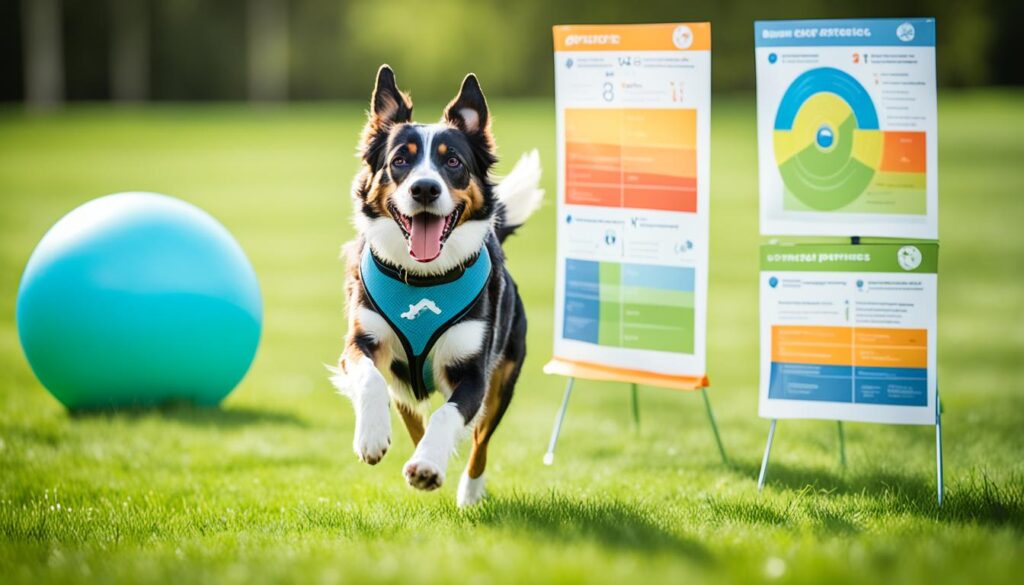As responsible pet owners, we understand the importance of maintaining our furry friends’ health and well-being. While it’s inevitable that our pets may encounter health issues from time to time, there are several strategies we can implement to manage and prevent common pet health problems. By staying proactive and taking the necessary precautions, we can help ensure that our pets lead happy and healthy lives.
From regular veterinary check-ups to proper nutrition and exercise, every aspect of pet care plays a vital role in their overall health. By following these pet health and wellness tips, we can minimize the risk of various health issues and provide our pets with the best possible care.
Throughout this article, we will explore different strategies for dealing with common pet health problems and offer practical advice to keep our pets in optimal health. Whether you’re a new pet owner or have had pets for years, these tips will help you navigate the world of pet care and ensure your furry friend stays healthy and happy.
Key Takeaways:
- Regular veterinary check-ups are crucial for early detection and prevention of common pet health problems.
- Proper nutrition and exercise are essential for maintaining your pet’s overall well-being.
- Dental care is often overlooked but plays a significant role in your pet’s health.
- Take preventive measures to counteract cancer risks and ensure your pet’s early spaying and neutering.
- Customize your pet’s nutrition and exercise regimens for their specific needs.
The Importance of Regular Veterinary Check-Ups for Detection and Prevention
Regular veterinary check-ups are essential for maintaining the health and wellness of your pet. These check-ups allow veterinarians to assess your pet’s overall well-being, detect potential health issues early on, and provide preventive care to ensure their long-term health. Through routine assessments, veterinarians can address common problems such as obesity, tick-borne illnesses, and the importance of vaccinations in disease prevention.
Effectiveness of Routine Assessments in Managing Pet Obesity
Obesity is a significant health concern for pets and can lead to various medical conditions, including diabetes, joint problems, and cardiovascular disease. During veterinary check-ups, veterinarians can evaluate your pet’s weight and body condition, provide nutritional recommendations, and create a tailored exercise plan to help manage and prevent obesity. By addressing obesity at an early stage, you can improve your pet’s quality of life and prevent further health complications.
Identifying and Protecting Dogs from Tick-Borne Illnesses and Heartworm
Tick-borne illnesses and heartworm are serious threats to your pet’s health. Regular veterinary check-ups enable veterinarians to examine your pet for signs of tick infestation, check for heartworm infection, and provide appropriate preventative measures. Through the use of vaccines, preventive medications, and education on tick prevention, your veterinarian can help protect your dog from these potentially life-threatening diseases.
The Crucial Role of Vaccinations in Disease Prevention
Vaccinations are a crucial aspect of preventive pet care. They help protect your pet from a range of infectious diseases, including rabies, distemper, parvovirus, and kennel cough. During veterinary check-ups, your veterinarian will ensure that your pet’s vaccinations are up to date and administer any necessary boosters. By keeping your pet’s vaccinations current, you can significantly reduce the risk of illness and promote their overall health.
Understanding and Managing Arthritis in Dogs
Arthritis is a common health issue in dogs, especially as they age. To prevent and manage arthritis, a combination of proper diet and exercise is crucial. By feeding your dog a balanced diet and providing regular exercise, you can help maintain joint health and minimize the risk of developing arthritis.
Diet and Exercise: The First Steps in Arthritis Prevention
A healthy diet plays a significant role in preventing and managing arthritis in dogs. Ensure that your dog’s diet includes essential nutrients such as omega-3 fatty acids, which have anti-inflammatory properties. Incorporate foods rich in these fatty acids, such as fish oil and flaxseed, into their diet.
Exercise is also essential in preventing arthritis. Regular physical activity helps maintain joint mobility and strengthens the surrounding muscles. Consider low-impact exercises like swimming or gentle walks to reduce stress on your dog’s joints. Consult with your veterinarian to develop an exercise routine suitable for your dog’s age, breed, and overall health.
The Role of Joint Supplements and Anti-Inflammatory Medications
In addition to a healthy diet and exercise, joint supplements can provide relief and improve mobility in dogs with existing arthritis. Glucosamine and chondroitin are commonly used supplements that support joint health and reduce inflammation. These supplements can be administered in various forms, such as chews or powders.
Anti-inflammatory medications prescribed by your veterinarian may also be necessary to manage arthritis in some cases. These medications help reduce pain, inflammation, and swelling, improving your dog’s quality of life. It’s important to follow your veterinarian’s recommendations and dosage instructions when administering these medications.
Incorporating these strategies into your dog’s daily routine can help prevent and manage arthritis, ensuring they lead a comfortable and active life. Remember to consult with your veterinarian for personalized advice and recommendations based on your dog’s specific needs.

Comprehensive Strategies for Maintaining Your Pet’s Dental Health
Dental health is often overlooked but plays a significant role in your pet’s overall well-being. Poor dental care can lead to dental disease and various complications, such as heart, lung, and kidney problems. To ensure your pet’s dental health, it’s essential to implement comprehensive strategies that include regular dental care and professional cleanings.
1. Dental Care at Home:
Regular brushing of your pet’s teeth is crucial for preventing dental disease. Purchase a pet toothbrush and toothpaste specifically formulated for animals. Brush your pet’s teeth at least two to three times a week. Start gradually to let your pet adjust to the process, and reward them with praise and treats to make it a positive experience.
Additionally, providing dental chews and toys can help clean your pet’s teeth and reduce plaque buildup. Look for products with the Veterinary Oral Health Council (VOHC) seal, indicating their effectiveness in promoting oral health.
2. Professional Dental Cleanings:
Your veterinarian may recommend professional dental cleaning under anesthesia to remove tartar and bacteria from your pet’s teeth and gums. This comprehensive cleaning includes scaling, polishing, and examination of the entire mouth. Professional cleanings should be performed annually or as advised by your veterinarian.
By implementing these comprehensive strategies for pet dental care, you can ensure your pet’s oral health and prevent dental disease and associated complications.
Navigating Pet Health: Addressing the Threat of Cancer in Dogs
Cancer is a devastating disease that can affect dogs just as it does humans. While not all forms of cancer can be prevented, understanding genetic factors and breed-specific risks can help identify potential risks early on. Additionally, early spaying and neutering can significantly reduce the risk of certain cancers. Regular veterinary check-ups and screenings can also aid in the early detection of cancer, increasing the chances of successful treatment.
Genetic Factors and Breed-Specific Risks in Canine Cancer
Genetics plays a role in the development of cancer in dogs. Some breeds are more predisposed to certain types of cancer due to their genetic makeup. By understanding these genetic factors and breed-specific risks, pet owners can work together with veterinarians to implement preventive measures and regular screenings. This proactive approach can help detect cancer in its early stages and improve treatment outcomes.
Preventive Measures: Importance of Early Spaying and Neutering
Early spaying and neutering refers to the surgical procedure performed on dogs at a young age to remove their reproductive organs. This procedure not only helps control the pet population but also reduces the risk of certain cancers, such as mammary and testicular cancers. Spaying and neutering can be beneficial in preventing these diseases, especially when done before the dog reaches sexual maturity. Consulting with a veterinarian about the appropriate timing for spaying or neutering can significantly contribute to the pet’s overall health and well-being.
Regular Veterinary Check-ups and Screenings for Early Detection
Regular veterinary check-ups and screenings are essential for detecting cancer in dogs at an early stage. During these visits, veterinarians may perform physical examinations, blood tests, and imaging studies that can detect signs of cancer. By scheduling these routine screenings, pet owners can increase the likelihood of detecting cancer early, leading to more effective treatment options and better outcomes for their beloved pets.

| Type of Cancer | Breed Predisposition |
|---|---|
| Mammary Cancer | Female dogs, particularly those who have not been spayed |
| Osteosarcoma | Large and giant breed dogs |
| Lymphoma | Golden Retrievers, Boxers, and Bullmastiffs |
| Hemangiosarcoma | German Shepherds, Golden Retrievers, and Labrador Retrievers |
Customizing Nutrition for Optimal Pet Health and Wellness
Proper nutrition is essential for maintaining your pet’s overall health and well-being. As pet owners, it’s our responsibility to ensure that we choose the right food that meets our pet’s specific dietary needs. Consulting with a veterinarian can help determine the optimal diet for your pet, taking into consideration factors such as age, breed, and any existing health conditions.
Choosing the Right Food for Your Dog
When it comes to selecting the right food for your dog, it’s important to consider their age, size, breed, and any specific dietary requirements. Some dogs may require a specialized diet due to allergies, sensitivities, or underlying health conditions. Your veterinarian will be able to recommend the appropriate type of food, whether it’s dry kibble, wet food, or a raw diet. Look for high-quality pet food brands that use natural ingredients and avoid fillers or artificial additives.
It’s also worth noting that puppies, adult dogs, and senior dogs have different nutritional needs. Puppies require a diet that supports their growth and development, while senior dogs may benefit from food that promotes joint health and supports aging bodies.
Monitoring Caloric Intake to Prevent Obesity
Obesity is a common health concern in pets and can lead to various health issues such as diabetes, heart disease, and joint problems. Monitoring your pet’s caloric intake is crucial to prevent obesity and ensure they maintain a healthy weight.
Consult with your veterinarian to determine the appropriate number of calories your pet should consume each day based on their age, weight, and activity level. Measuring portions and avoiding excessive treats can help prevent overfeeding. It’s also important to provide regular exercise to keep your pet active and help them burn calories.
| Benefit of Customized Nutrition | How to Achieve it |
|---|---|
| 1. Improved overall health and well-being | Consult with a veterinarian to determine the optimal diet for your pet |
| 2. Prevention of dietary-related health issues | Choose high-quality pet food brands that use natural ingredients |
| 3. Weight management and prevention of obesity | Monitor your pet’s caloric intake and provide regular exercise |
| 4. Support for specific dietary requirements or health conditions | Consult with a veterinarian for specialized diets if needed |
Physical Activity: Tailoring an Exercise Regimen for Your Pet
Regular physical activity is vital for keeping your pet healthy and fit. Just like us, our pets need exercise to maintain their overall well-being. By providing them with opportunities for physical activity, we can ensure that they stay active, maintain a healthy weight, and prevent behavioral issues.
When it comes to designing an exercise regimen for your pet, it’s important to consider their age, breed, and energy level. Different pets have different exercise needs, so tailoring their exercise routine to their specific requirements is essential.
Engaging in activities such as walks, playtime, and interactive toys can not only help your pet maintain a healthy weight but also provide mental stimulation. Mental stimulation through exercise can prevent boredom, reduce anxiety, and improve overall behavior.
To ensure that you’re providing the right amount and type of exercise for your pet, consult with your veterinarian. They can provide valuable recommendations based on your pet’s individual needs and help you create a customized exercise plan.
To get started, here are some pet exercise tips:
- Take your dog for daily walks. This helps them burn off energy and provides an opportunity for mental stimulation.
- Play games of fetch or tug-of-war with your pet. These activities are not only physically engaging but also strengthen the bond between you and your furry friend.
- Invest in interactive toys that stimulate your pet’s mind and keep them entertained.
- Consider agility training or obedience classes for dogs, as these activities provide both physical and mental exercise.
- Rotate your pet’s toys regularly to prevent boredom and keep them interested in playtime.
- If you have a cat, provide climbing towers or scratching posts to encourage physical activity.
Remember, consistency is key. Aim to incorporate daily exercise sessions into your pet’s routine to ensure prolonged health and well-being.

Stay Vigilant with Annual Wellness Exams and Early Disease Detection
Annual wellness exams play a crucial role in ensuring your pet’s health and detecting any underlying issues before they become more serious. These regular check-ups are an opportunity for your veterinarian to assess your pet’s overall well-being and identify any potential health concerns. By staying vigilant and scheduling annual wellness exams, you can take proactive steps to prioritize your pet’s health and well-being.
Key Assessments During Routine Vet Visits
During your pet’s annual wellness exam, your veterinarian will perform a series of key assessments to evaluate their overall health. These assessments may include:
- Physical examination: Your veterinarian will thoroughly examine your pet, assessing their body condition, joints, organs, and overall physical health.
- Bloodwork: Blood tests can provide valuable information about your pet’s internal health, including organ function, blood cell counts, and metabolic markers.
- Fecal exam: A fecal exam helps detect the presence of parasites and gastrointestinal issues that may be affecting your pet’s health.
These assessments are essential for detecting any potential health issues early on, allowing for timely intervention and treatment to ensure your pet’s well-being.
Interpreting Bloodwork and Fecal Exams for Underlying Issues
Interpreting the results of bloodwork and fecal exams requires the expertise of a veterinarian. Your veterinarian will analyze the results and provide you with a detailed understanding of your pet’s health. They will explain any abnormalities, discuss potential underlying issues, and recommend appropriate treatment or preventive measures.
By understanding and interpreting the results of these diagnostic tests, you can be informed about your pet’s health status and make educated decisions regarding their care. It’s important to consult with your veterinarian to ensure a comprehensive understanding of the findings and to address any concerns you may have.
Keeping Your Dog Current with Vaccinations and Parasite Prevention
Vaccinations and parasite prevention are crucial components of preventive pet care. By staying up-to-date with your dog’s vaccinations and implementing preventive measures against parasites, you can ensure your pet’s continued health and well-being. Understanding the essentials of dog vaccination schedules and integrating flea, tick, and heartworm preventatives into your pet’s care routine are essential steps in maintaining their overall wellness.
Understanding the Essentials of Dog Vaccination Schedules
Vaccinations are essential in protecting your dog from a range of infectious diseases. There are different types of vaccines available, including core vaccines that are recommended for all dogs and non-core vaccines that are specific to certain geographic regions or lifestyles. Core vaccines typically protect against diseases such as rabies, canine distemper, canine parvovirus, and canine adenovirus. Non-core vaccines might include protection against Lyme disease, leptospirosis, or Bordetella.
It is important to consult with your veterinarian to create a vaccination schedule that meets your dog’s specific needs. Vaccinations are typically administered in a series of shots during the first year of a dog’s life, followed by regular boosters to maintain immunity. Your veterinarian will be able to provide guidance on the appropriate timing and frequency of vaccinations based on your dog’s age, health, and lifestyle.
Integrating Flea, Tick, and Heartworm Preventatives Into Your Pet’s Care
Preventing parasite infestations is essential for your dog’s overall health and well-being. Fleas, ticks, and mosquitoes can transmit diseases and cause discomfort for your pet. It is important to implement preventive measures against these parasites to keep your dog protected.
Flea and tick prevention typically involves the use of monthly topical treatments, oral medications, or collars that repel or kill these pests. These preventive products are designed to kill fleas and ticks at various stages of their life cycle and prevent infestations from occurring. Regular use of a veterinarian-recommended preventive product can provide effective protection for your dog.
In addition to flea and tick prevention, heartworm prevention is also crucial for your dog’s health. Heartworms are transmitted through mosquito bites and can cause serious and potentially life-threatening problems. Preventive medications are available in the form of monthly chewable tablets or topical treatments. These medications kill the immature heartworm larvae, preventing them from developing into adult worms in your dog’s heart.
To ensure the effectiveness of parasite preventatives, it is important to administer them regularly according to the recommended dosage and schedule. Consult with your veterinarian to determine the most appropriate preventive products for your dog’s specific needs and to develop a comprehensive parasite prevention plan.

| Vaccinations | Core Vaccines | Non-Core Vaccines |
|---|---|---|
| Rabies | Lyme Disease | Leptospirosis |
| Canine Distemper | Canine Parainfluenza Virus | Bordetella |
| Canine Parvovirus | ||
| Canine Adenovirus |
Pet Health and Wellness Tips: Counteracting Disease with Cleanliness
Maintaining cleanliness is key to preventing the spread of diseases among pets and from wildlife to pets. By implementing proper hygiene practices and cleanliness routines, you can help ensure the health and wellness of your furry friend. Here are some tips to keep in mind:
Practices to Limit Disease Transmission from Wildlife
- Keep pet food and water indoors to minimize exposure to wildlife.
- Seal off any openings in your home, such as cracks and crevices, to prevent wildlife from entering.
- Secure trash cans with tight-fitting lids to deter animals from scavenging.
- Remove standing water sources, such as birdbaths and stagnant puddles, which can attract wildlife.
- Regularly inspect your yard for any potential habitats or hiding places for wildlife, such as brush piles or tall grass.
- Consider installing fencing or netting to create a physical barrier between your pet and wildlife.
Proper Hygiene for Pet Owners to Reduce Disease Risk
As a pet owner, practicing good hygiene is crucial to reduce the risk of disease transmission. Here are some essential hygiene practices to incorporate into your routine:
- Wash your hands: Thoroughly wash your hands with soap and water after handling your pet, their belongings, or any waste.
- Clean pet bedding and toys: Regularly clean and wash your pet’s bedding and toys to remove dirt, bacteria, and parasites.
- Practice proper waste disposal: Dispose of pet waste promptly and hygienically. Use designated waste bags and designated bins to prevent contamination.
- Keep grooming tools clean: Regularly clean and disinfect grooming tools to prevent the spread of bacteria or parasites.
- Establish a regular bathing schedule: Depending on your pet’s needs, establish a regular bathing schedule to keep their coat clean and free from dirt and potential allergens.
“Maintaining cleanliness is key to preventing the spread of diseases among pets and from wildlife to pets.”
By following these pet health and wellness tips, you can create a clean and healthy environment for your beloved pet. Remember, regular veterinary care and consultations are essential for keeping your pet in optimal health.
The Dangers of Home and Environmental Hazards to Pets
Pets can be exposed to various hazards within their environment, including toxic plants, chemicals, and household items. Understanding potential dangers and taking appropriate measures to ensure a pet-safe environment is essential. This includes keeping hazardous substances out of reach, securing electrical cords, and being aware of potential dangers in the yard. Regularly inspecting your home and outdoor areas for hazards can help prevent accidents and keep your pet safe.
One common hazard for pets is toxic plants. Some common plants, such as lilies, tulips, and azaleas, can be poisonous to pets if ingested. It’s important to be aware of the plants in your home and yard and ensure they are safe for your pet. If you are unsure whether a plant is toxic, consult with your veterinarian or refer to a reliable online resource.
Another potential danger for pets is exposure to chemicals. Many household items, including cleaning products, pesticides, and certain medications, can be toxic to pets if ingested or inhaled. It’s crucial to store these items in secure cabinets or areas where pets cannot access them. Additionally, when using chemicals in the home or yard, ensure that your pet is kept away from the area until it is safe.
Electrical cords can also pose a risk to pets, especially those that like to chew. It’s important to secure cords out of your pet’s reach or use cord protectors to prevent them from being chewed, which can lead to electric shock or other injuries.
When it comes to the yard, there are potential hazards that pet owners should be aware of. These include toxic plants, fertilizers, pesticides, and even certain types of mulch. It’s essential to research and identify any potential dangers in your yard and take steps to eliminate or mitigate them.
To summarize, pet owners should be proactive in creating a safe environment for their furry friends. This involves being knowledgeable about potential hazards such as toxic plants, chemicals, and electrical cords. Regular inspections and taking appropriate measures to address any risks can help prevent accidents and ensure the well-being of your pet.
Conclusion
By implementing these strategies and practicing proactive pet care, you can effectively manage and prevent common health problems in your furry friend. Taking the necessary steps such as regular check-ups, proper nutrition, exercise, and preventive care can significantly contribute to your pet’s overall well-being and longevity. It is essential to remember that each pet is unique, and consulting with your veterinarian for personalized advice and recommendations based on your pet’s specific needs is crucial.
By working closely with your veterinarian, you can develop a comprehensive care plan tailored to your pet’s individual requirements. Regular veterinary check-ups, including routine assessments, vaccinations, and screenings, will help ensure early disease detection and intervention, leading to better outcomes. Additionally, keeping your pet’s nutrition and exercise regimen in check and maintaining a clean environment for them will promote optimal health and wellness.
With proper care and attention, you can enjoy a long, healthy, and happy life with your beloved pet. Remember, your veterinarian is your trusted partner in your pet’s well-being, so don’t hesitate to seek professional guidance whenever needed. We hope these pet health and wellness tips have empowered you to take proactive steps towards ensuring the best possible care for your furry friend. May your pet thrive in good health and bring you joy for years to come!
FAQ
What strategies can I use to deal with common pet health problems?
To manage common health problems in your pet, it is crucial to schedule regular veterinary check-ups, provide proper nutrition, exercise your pet, and practice preventive care.
Why are regular veterinary check-ups important for my pet?
Regular veterinary check-ups allow veterinarians to assess your pet’s overall health, detect early signs of obesity, identify and protect against tick-borne illnesses and heartworm, and administer necessary vaccinations to prevent various diseases.
How can I prevent and manage arthritis in my dog?
Proper diet and exercise are crucial in the prevention and management of arthritis. Feeding your dog a balanced diet and providing regular exercise can help maintain joint health and minimize the risk of developing arthritis. Joint supplements and anti-inflammatory medications recommended by your veterinarian can provide relief and improve mobility for dogs with existing arthritis.
How can I ensure my pet has good dental health?
Regular dental care is essential for your pet’s overall well-being. This includes brushing your pet’s teeth and providing dental chews. Your veterinarian may also recommend professional dental cleaning under anesthesia to keep your pet’s teeth and gums healthy.
What can I do to address the threat of cancer in my dog?
While not all forms of cancer can be prevented, understanding genetic factors and breed-specific risks can help identify potential risks early on. Additionally, early spaying and neutering can significantly reduce the risk of certain cancers. Regular veterinary check-ups and screenings aid in the early detection of cancer, increasing the chances of successful treatment.
How important is proper nutrition for my pet’s overall health?
Proper nutrition is crucial for maintaining your pet’s overall health and well-being. Consult with your veterinarian to determine the optimal diet for your pet, considering factors such as age, breed, and any existing health conditions. Monitoring your pet’s caloric intake is important to prevent obesity, which can lead to various health issues.
What role does exercise play in keeping my pet healthy?
Regular physical activity is vital for keeping your pet healthy and fit. Tailor an exercise regimen that suits your pet’s age, breed, and energy level. Engaging in activities such as walks, playtime, and interactive toys not only helps maintain a healthy weight but also provides mental stimulation and prevents behavioral problems.
How important are annual wellness exams for my pet?
Annual wellness exams are crucial for monitoring your pet’s health and detecting any underlying issues early on. During these visits, your veterinarian will perform key assessments, including physical examinations, bloodwork, and fecal exams, to evaluate your pet’s overall health and identify any potential problems.
Why are vaccinations and parasite prevention important for my dog?
Vaccinations play a critical role in protecting your dog from various infectious diseases. Understanding the essentials of dog vaccination schedules, including core and non-core vaccines, can help ensure your pet receives the necessary protection. Additionally, integrating flea, tick, and heartworm preventatives into your pet’s care routine is essential to prevent parasite infestations and associated health complications.
What practices can I implement to maintain cleanliness and prevent disease transmission?
Maintaining cleanliness is key to preventing the spread of diseases among pets and from wildlife to pets. Implementing practices such as regular bathing, proper waste disposal, and cleaning pet bedding and toys can help limit disease transmission. Additionally, practicing good hygiene as a pet owner, including regularly washing hands after handling pets and their belongings, is crucial to reduce the risk of disease transmission.
How can I prevent hazards and create a safe environment for my pet?
Pets can be exposed to various hazards within their environment, including toxic plants, chemicals, and household items. Understanding potential dangers and taking appropriate measures to ensure a pet-safe environment is essential. This includes keeping hazardous substances out of reach, securing electrical cords, and being aware of potential dangers in the yard.
What can I do to ensure my pet enjoys a long, healthy, and happy life?
By implementing strategies such as regular veterinary check-ups, proper nutrition, exercise, and preventive care, you can effectively manage and prevent common health problems in your pet. Remember to consult with your veterinarian for personalized advice and recommendations based on your pet’s specific needs.
Source Links
- https://www.newhopeanimalhospital.com/site/blog/2022/01/21/6-tips-for-maintaining-your-dogs-health
- https://hastingsvet.com/6-common-dog-health-problems-prevention-tips-and-why-to-prevent/
- https://www.webmd.com/pets/features/protect-pets-disease

